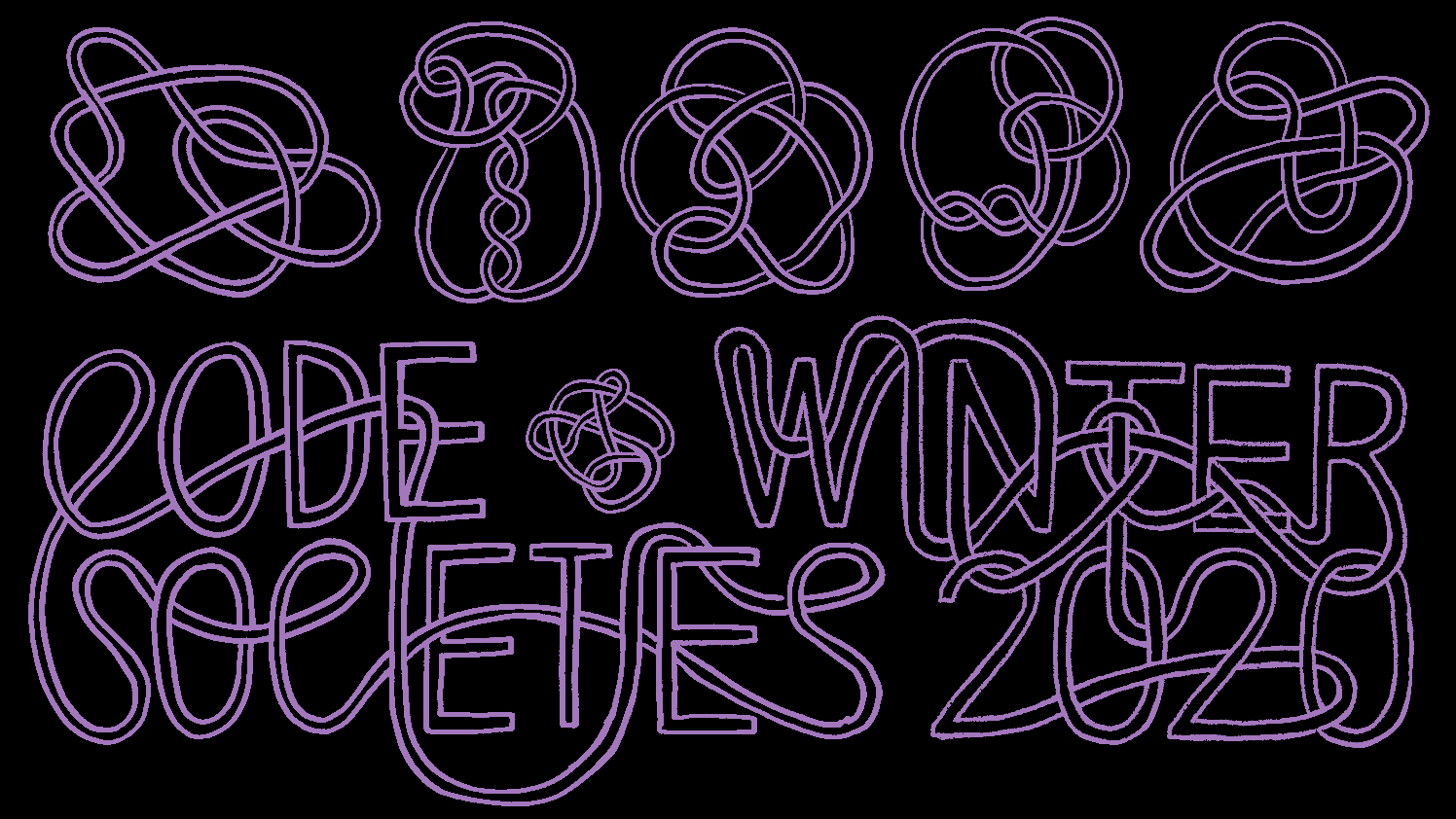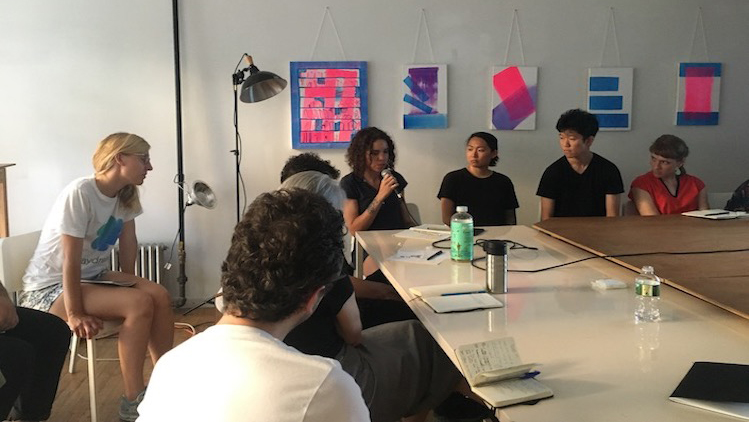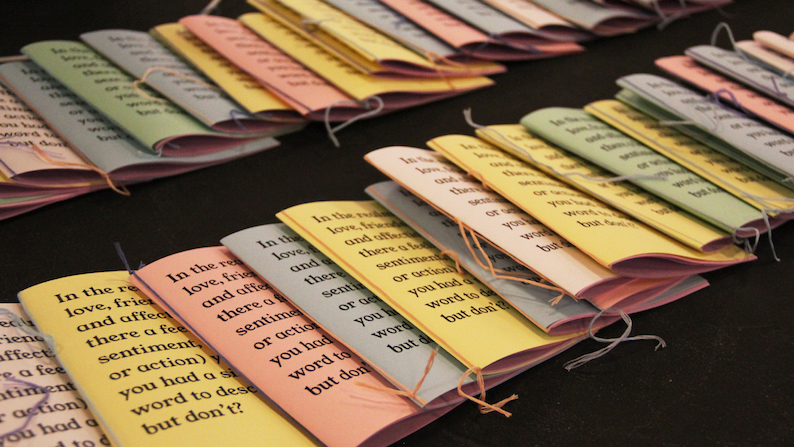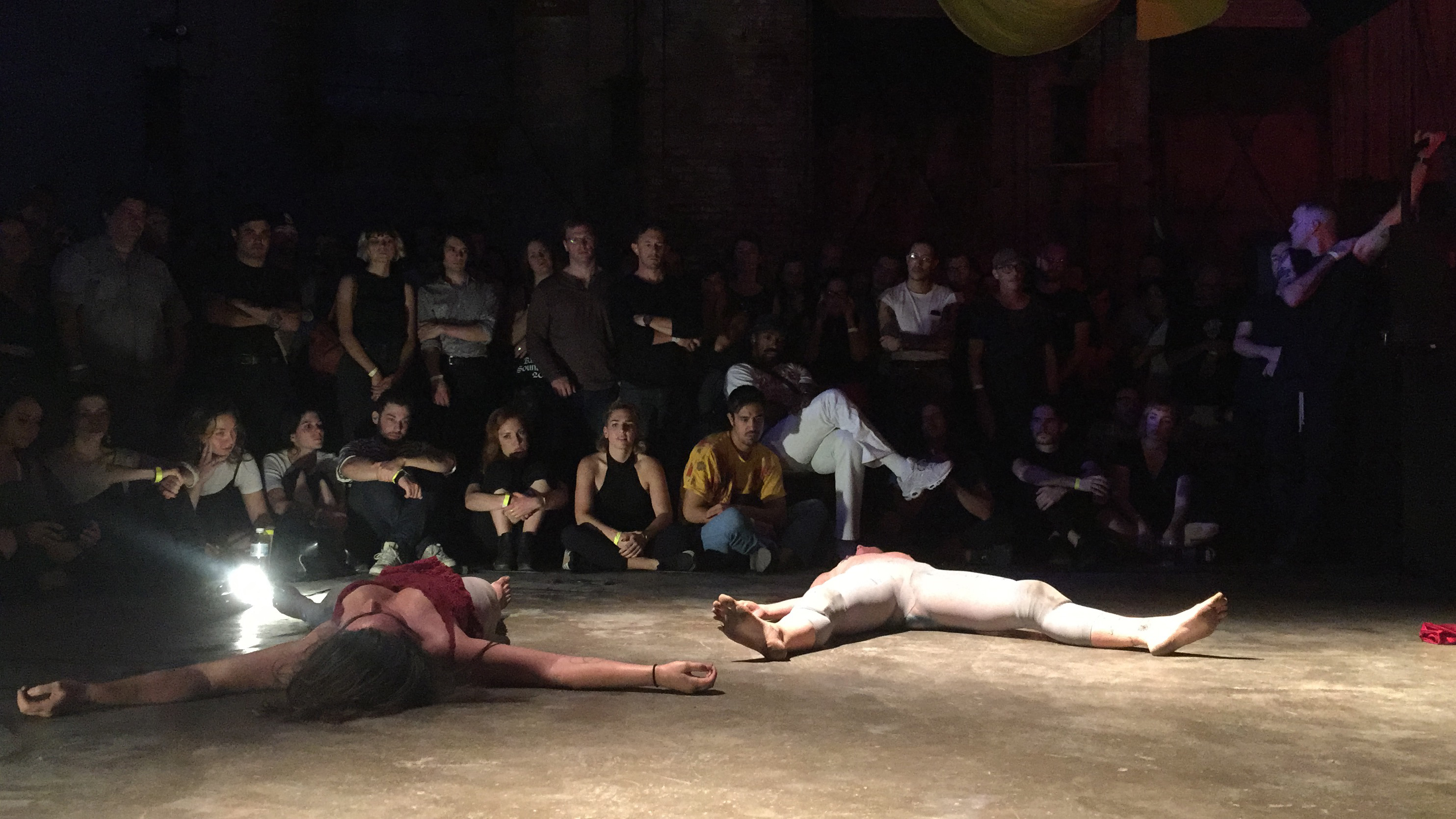Code Societies Website & Blog: sfpc.io/code-societies
- Three-Week Session, Monday January 6th - Saturday January 25th 2020
- SFPC, 155 Bank Street, West Village, NYC
- 6:30pm - 9:30pm, Evening Classes
- Applications are closed
School for Poetic Computation(SFPC)’s winter intensive is an introduction to re-introducing yourselves to computers. How do different platforms and processes—including algorithms, surveillance, social media, infrastructure, and interface—yield distinct modes of seeing, thinking, feeling, and reinforce existing systems of power? We will examine how code and societies shape and are shaped by each other by building new codes made of the the digital, the social, and the ritual, on a foundation of shared experience and a commitment to learning with care together. Code Societies is about redrawing the divisions that make us and unmake us. We’ll begin by challenging the division between those who code software and those who are coded by it.
No coding experience necessary: This session centers the learning experience of beginner programmers. We will argue that everyone who interacts with computers has—in important ways—always already been programming them.1
Through a balanced, interwoven study of critical theory and hands-on coding workshops, students will develop several small scores or sketch pieces online, on screens, performed, or installed. We’ll cover foundational methods of coding with Python, coding on the web, navigating the command line, and working with zines as a technology. The classes are held in the evenings and are designed to engage with code, and the ways code acts on our bodies and networks, equally as subject and as medium. Code Societies is an invitation to use code to choreograph new ways of being with each other within the unique learning environment of SFPC.
We will work together to create boundaries that make it easier for everyone involved to feel as safe and comfortable as possible throughout the session. SFPC is a school organized by people who are committed to making space for people who exist at the intersections of oppressed identities, including but not limited to, those who are queer, trans, people of color, disabled, deaf, or hard of hearing. Code Societies studies the very systems that create barriers to technology and learning. The process of ideological confrontation can sometimes feel uncomfortable. We understand safety is relative and in constant negotiation. We also distinguish safety from discomfort, as there is no such thing as a never uncomfortable space.2 Read more about the SFPC code of conduct here.
14 class days in total with a Student Showcase presentation on January 25th.
Code Societies 2020 teachers and to be announced soon!
The Teachers & Organizers of Code Societies 2020
Allison Parrish (Teacher) is a computer programmer, poet, educator and game designer whose teaching and practice address the unusual phenomena that blossom when language and computers meet. She teaches at NYU’s Interactive Telecommunications Program.
American Artist (Teacher) attended the Whitney Independent Study program as an artist. They are a former resident of Abrons Art Center and EYEBEAM, and a 2018-2019 recipient of the Queens Museum Jerome Foundation Fellowship. They have exhibited at the Museum of African Diaspora, San Francisco; the Studio Museum in Harlem; Museum of Contemporary Art Chicago, and Koenig & Clinton, New York. They have published writing in The New Inquiry and New Criticals and have been featured in The New York Times, Artforum, ARTnews, and Huffington Post. Artist is the art director of the arts and politics publication unbag, lives and works in Brooklyn, NY.
Dan Taeyoung (Teacher) is a learner, teacher, spatial designer, technologist, and artist, creating design tools, architectural spaces, and social collectives. They are interested in how our environments and relations change the way we think, feel, collaborate, and play together. I teach at Columbia University GSAPP, am a founding member of Soft Surplus (a community space for making and learning near each other), and the Cybernetics Library, an artist-run library focused on socio-technological systems.
Emma Rae Norton (Assistant Organizer & Teacher) is an artist working with and through software. Her work, while mostly existing online, has appeared in the form of DAT zines, CD-ROM and collaborative hand coding workshops. Emma is committed to unpacking the ubiquitous networked and computational world that she lives in through a research-based art practice. Her current research focuses on the computer mouse as an impactful technological object — most recently taking the form of writing, the co-organization of a computer mouse conference, and scrolling lectures.
Everest Pipkin (Teacher) is a drawing and software artist from Bee Caves, Texas, who produces intimate work with large data sets. Through the use of online archives, big data repositories, and other resources for digital information, they aim to reclaim the corporate internet as a space that can be gentle, ecological, and personal.
FlucT (Teacher) is the collaborative work of Sigrid Lauren & Monica Mirabile addressing issues in the capital obedience of American culture through choreography and performance. Creating original narrative soundscapes linking a manipulated pop music psychosis with violently intimate dance, their composition is a projection driven to expose the psychology of this social paradigm. They founded Otion Front Studio, a performance/dance space in the Bushwick neighborhood of Brooklyn, New York.
Harlo Holmes (Teacher) is the Director of Newsroom Digital Security at Freedom of the Press Foundation. She strives to help individual journalists in various media organizations become confident and effective in securing their communications within their newsrooms, with their sources, and with the public at large.
Kameelah Janan Rasheed (Teacher) is an artist and learner who seeks to make her thinking visible through an ecosystem of iterative and provisional projects/processes. This includes sprawling xerox-based “architecturally-scaled collages” (Frieze Magazine, Winter 2018), publications, large-scale text banner installations, digital archives, lecture performances, library interventions, and other forms yet to be determined. Her work has been exhibited at the 2017 Venice Biennale, Institute of Contemporary Art - Philadelphia, Portland Institute of Contemporary Art, Brooklyn Museum, Queens Museum, Bronx Museum, New Museum, Studio Museum in Harlem, Printed Matter, The Kitchen, Jack Shainman Gallery, Schomburg Center for Research in Black Culture, Brooklyn Academy of Music, Project Row Houses, Pinchuk Art Centre, Bétonsalon - Centre d’art et de recherche, and others. Her solo show, Scoring the Stacks at Brooklyn Public Library (Central) invites visitors to wander and explore the library stacks through a series of scores.
Melanie Hoff (Lead Organizer & Teacher) is an artist and educator examining the role technology plays in social organization and reinforcing hegemonic structures. Their work uncovers coded conventions of norms, interfaces, and sex, through software, installation, and new choreographies of exchange. They are a founding member of Soft Surplus, (a community space for making and learning near each other), the Cybernetics Library (an art and research collective offering resources for study and critique of socio-technological systems) and they teach at the Rhode Island School of Design and SFPC where they will be organizing Code Societies for the third time this winter.
Neta Bomani (Assistant Organizer & Teacher) is a worker who engages in visual storytelling, direct action and anti art practices through organizing and making archives, writings, prints, zines, circuits and workshops. Neta’s work has materialized as an educator of the Pioneer Works collaboration with Good Shepherds after school programs, a steward of the School for Poetic Computation, a member of Stephanie Dinkins Studio and a participator in grassroots organizing against prisons and borders in New York City and beyond in solidarity with No New Jails, Take Back the Bronx and more.
Ruha Benjamin (Teacher) is Associate Professor of African American Studies at Princeton University, founder of the JUST DATA Lab, and author of Race After Technology: Abolitionist Tools for the New Jim Code (Polity 2019) and editor of Captivating Technology: Reimagining Race, Carceral Technoscience, and Liberatory Imagination in Everyday Life (Duke 2019) among many other publications. Ruha’s work investigates the social dimensions of science, medicine, and technology with a focus on the relationship between innovation and inequity, health and justice, knowledge and power.
Simone Browne (Teacher) is a professor at the University of Texas at Austin. Her first book, Dark Matters: On the Surveillance of Blackness, examines surveillance with a focus on transatlantic slavery, biometrics, airports and creative texts.
Taeyoon Choi (Session Advisor & Teacher) is an artist, writer, and a co-founder of SFPC. He works on accessibile and inclusive art and technology education. He works for disability rights and environmental justice. He collaborates with various artists and engineers on the Distributed Web of Care.
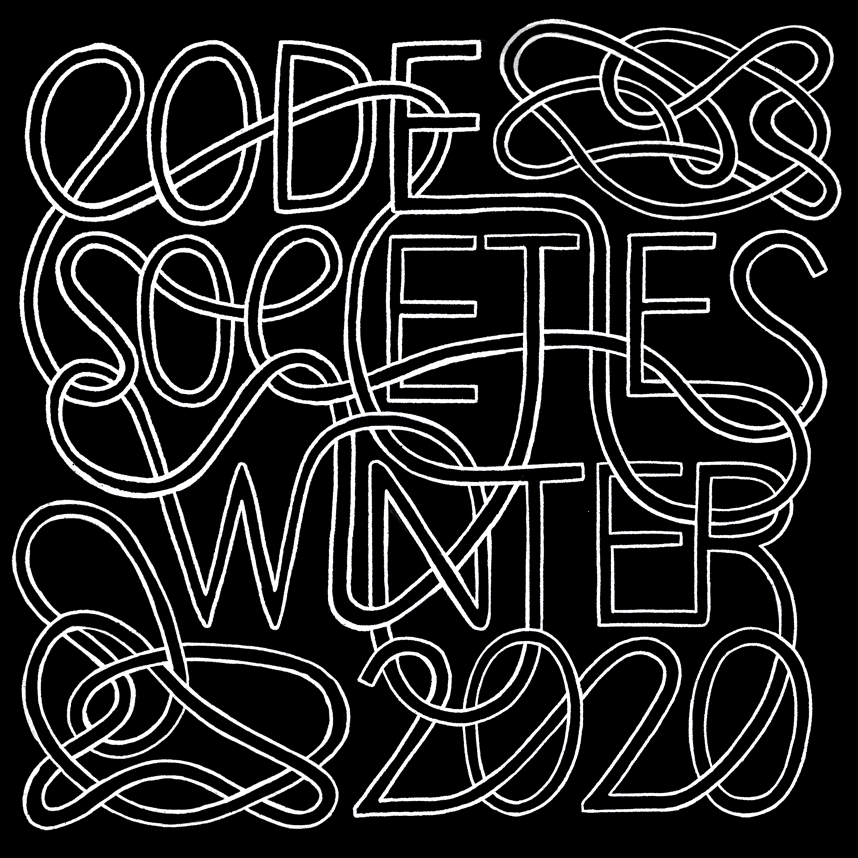
Classes taught in Code Societies Winter 2019
Nabil Hassein & Melanie Hoff taught Computational Methods of Code Societies
An introduction to the the programmer, the computer, and the environments they create together. We wrote folder poetry in the command line, coded socially with Github, and processed language with Python.
⤳ Blog Post
American Artist taught Software as Ideology
We Discussed how software, from programs to GUIs, can teach us about how we enact ideology in our lives.
⤳ Blog Post
Everest Pipkin taught Building Nets for Floating Data
We learned how to scrape the web while asking the question, what does consent mean when repurposing online data?
⤳ Blog Post
Allison Parrish taught The Computational Scrawl
We examined the physical gesture and material artifacts of the act of writing, as seen through the lens of computation and digital media.
⤳ Blog Post 1
⤳ Blog Post 2
Ingrid Burrington taught Networked Terraforming
We deconstructed the internet as the largest global terraforming project.
⤳ Blog Post 1
⤳ Blog Post 2
Melanie Hoff taught Cybernetics of Sex: Technology, Feminism(s), and the Choreography of Culture
We considered the social norms and laws that regulate reproduction, sex, & gender as a case study for thinking about systemic problems and feedback loops.
⤳ Blog Post
BUFU taught WYFY: Exorcizing Technology
We Went on a journey to rethink building more equitable spaces IRL/URL and participated in meditative exercises to exorcize technology.
⤳ Blog Post
Dan Taeyoung taught Ethicsware
We asked what is intimate software, created by us, only for us, that debates with our ethical selves? We used Python to create software that debates and disputes, rather than fulfills our desires.
⤳ Blog Post
Nora Khan taught Critical Simulation
We rethought techno-utopian ideals of neutrality that perpetuates the idea of a “just world” which assumes a flat plane of opportunity. Together we imagined alternative simulations of collective futures we wanted to be a part of.
⤳ Blog Post
FlucT taught We Play Programmed
An embodied workshop and performance about performance both as art and behavior. We explored how behaviors are prioritized by social programming, whether by poetry or by survival.
⤳ Blog Post
Taeyoon Choi taught Distributed Web of Care
Taeyoon prompted us to think about not simply decentralizing networks, but taking a step further to weave a distributed web of care. Through code, movement, and string we practiced an understanding of that which could not be verbalized.
⤳ Blog Post
Check out the classes and blog postings from Code Societies 2018 here.
 Code Societies plotter drawing by AC Gillette 2019
Code Societies plotter drawing by AC Gillette 2019
Student Quotes
Check out Emma Norton’s Student Showcase project from Code Societies 2019,
A Collaborative Archive of Code Societies Ephemera
“This experience was comparable to reading a book that jars me ideologically, changes my conception of possibility, and gives me a new framework for approaching the experience of being a person with a body in a place.” - Mimi Doan after FlucT’s class during Code Societies 2019
“For me Code Societies was an entanglement of ideas, movement and metaphor […] we listened to each other, moved our bodies through space, and shared with each other ways of seeing the world and ourselves.” - Emma Rae Norton from their project, A collaborative Archive of Code Societies Ephemera, 2019
What will happen in these three weeks?
Classes are held in the evenings Monday-Friday from 6:30-9:30pm with a day off on Martin Luther King Day January 21st. SFPC space will be open for students on weekdays between 3:30pm-6pm. The session will culminate in a party on the evening of Saturday January 25th, where students can invite their friends and present their projects and reflections.
Students will have full access to the space during open hours for the three weeks of the session to work on projects between classes and mentors will be readily available for technical, conceptual, and artistic guidance.
How do I apply?
Applications are now closed
We accept up to 18 students on a rolling basis until Monday, December 1st. Rolling admissions means there are fewer and fewer slots the longer you wait, so if you’re interested in the program get your application in early! We will respond to your application within 3 weeks of submission.
How competitive is the admissions?
SFPC admissions is highly competitive. Every session, we receive up to 80 applicants and select 18. We focus on creating diversity among our student body. We work with a group of alumni and teachers to review and select students based on their work samples and essays.
How much is tuition?
$3,000 USD for the 3-week program. You’ll also need to cover your own cost of living, including housing and meals (recent alumni report this to be in the range of $800 - $1400). Upon acceptance, payment of full tuition, your space in the class will be reserved. SFPC tuition goes directly to paying for the teachers, organizers, materials and space that make sessions like this possible.
Do you offer scholarship?
UPDATE: SFPC Code Societies is offering a fully subsidized work-study position for Black, Brown and Indigenous people of color; those who are low income and/or underrepresented in art/tech/academia. Thanks to a generous donation from Daniel Shiffman.
We are completely self-funded, which dramatically limits our ability to offer scholarships. In Code Societies, we are offering three work-study opportunity to a qualified applicant who would be expected to work 5 hrs/week in exchange for a 50% reduction of tuition. We’re particularly looking out for women, people of color, disabled person, people under-represented in the field of art + technology, and those with financial need.
Please note that if you apply for work study, we will consider your application separately from the general admissions applications, since we have little flexibility regarding scholarships. This is for people who absolutely need assistance to participate in SFPC. Occasionally, students have received support from cultural foundations, schools or current employers and we are happy to provide supporting materials as proof of acceptance.
Cancellation and refund policy
- If you are accepted and need to cancel, we can give you 100% refund up to December 15th, 2019.
- 50% refund between December 15th – December 25th, 2020.
- 25% refund between December 25th – January 3rd, 2020.
- No refunds can be given after January 3rd, 2020.
- Participation is not transferrable to another person.
What is expected of me?
- Come to all classes and thoughtfully engage with your classmates and teachers.
- We are looking for autodidacts from all backgrounds who are curious, generous and open.
- We welcome students with a broad array of technical experiences–no coding experience is required, but a basic comfort level with technology is preferred.
- B.Y.O.Laptop (Mac / PC / Linux)
Where is SFPC?
We are located at 155 Bank Street, in the courtyard of the Westbeth Artists’ Community in Manhattan’s West Village, New York City.
Contact Us
Feel free to contact Code Societies lead organizer Melanie Hoff (hoffmelanie@gmail.com) with any questions about the Code Societies session, or taeyoon@sfpc.io for any general questions about finances or the school.
Image credits Graphics by Lisa Larson Walker Photos by Taeyoon Choi, Melanie Hoff, Emma Rae Norton, Nicole Cheng, Mimi Doan
SFPC is filled with amazing people and an open mindset to learning, and doing. It has taught me different ways of thinking, ones that I would be sure to bring back to my endeavors outside of the art world.
I'm half way through the program and I'm already missing being here. SFPC was a much needed breath of fresh air in my hectic creative existence, an unlikely place to stop and remind myself what was it I was into in the first place.
SFPC messed up my life a little bit. Actually, I think it's going to mess it up a lot. Before this program I thought I knew what I was doing and what the shape of my life was going to look like. Now I don't and each day I wake up scared I won't get to be a part of a community like this again. Everyday also now brings a fresh but welcome creative terror to overcome. Also I think I may have ended up moving to New York accidentally.
SFPC is the best place you can explore your interest as much as you want and the place you start to write your own poem.
SFPC is not really a school or a course — it is more like a door into an extraordinary world. It is driven by passion, kindness and the thrill of teaching and learning. I would love to live those inspiring weeks all over again.
SFPC was amazing — life-changing even — i want to do all this stuff for the rest of my life!
I've never been consistently surprised and inspired as much as at SFPC.
If you think SFPC is what you think, that will be wrong. SFPC is a space for a group of people who badly want to try something new. SFPC will become a spirit embedded in your blood which makes you think things with a different angle, just like its motto: more poetry, less demo.
I learned a lot at SFPC. It was only a 2 week program last time, but I learned many things from other participants and got the chance to explore and fail freely. SFPC helped me to reshape the way I think. It's your turn.
School For Poetic Computation is equal parts The Factory, childhood blanket fort, and mad scientist's lab. I learned a ton from the teachers and the whole SFPC community in a huge collaborative and exploratory environment.
Attending SFPC is like walking into an all day buffet supplied with food from hyper-talented chefs. There's more than you could ever consume, naturally, and you will most likely find yourself requiring a digestion period, but holy crap is it tasty.
My takeaway from SFPC: Never settle for code that isn't at least a little bit magic
In SFPC I found a great community and it gave me the confidence to take on coding projects I couldn't have done before.
SFPC is the purest, most honest exchange of knowledge and experience among peers I have ever experienced. It is a supportive space where everyone learns from everyone, and bridges are built that continue to be strengthened for years to come. You won’t get a certificate or a title at the end of it, but I would be amazed if you ever looked at your world the same again. I haven’t.
